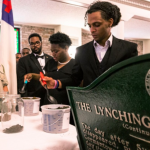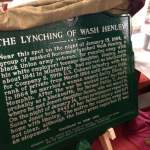On Saturday, October 19, 2019, the Lynching Sites Project of Memphis dedicated two markers to African American victims lynched in Shelby County, Tennessee. One was killed in 1851 and the other in 1869. I have long contended that there is a straight line between the events of yesteryear and the way African Americans are treated and perceived by very powerful and influential voices today.
The name of the 1851 victim is unknown, but for purposes of this article, I refer to him as George. The 1869 victim was Wash Henley.
In 1851 African American freedom was not a guarantee of the US Constitution. What was guaranteed and protected by the US Constitution was the right of slaveholders to hold and maintain ownership of African Americans as property.
Paradoxically there were free African American men and women in the South, as well as the North, despite the dominance of slavery in the Southern States. Their freedom while not guaranteed by the constitution was tenuous at best and often depended on the mood or disposition of the white person challenging their freedom. Such was the case with George on New Year’s Day January 1, 1851.
George arrived in Memphis and was challenged to produce his papers. Upon presentation, his papers were declared a forgery by the Shelby County Recorder, John Chester. Upon hearing the declaration of his loss of freedom, George pulled a pistol and shot John Chester in the back of the head. Within hours a mob formed and he was hanged in downtown Memphis. Such was the custom and climate of the country during the antebellum period. Challenge the right of an African American to be free as God intended, and meet out whatever punishment you desire if you don’t agree.
There is as much truth in the 21st Century in William Faulkner’s oft-repeated quote, “The Past Isn’t Dead. It Isn’t Even Past”, as it was when written in Requiem for a Nun, first published in 1951.
In 2008, “Birtherism” is symbolically John Chester declaring a long-form birth certificate from a US State to be a “forgery”.
Negro, show me your papers . . . mic drop.








